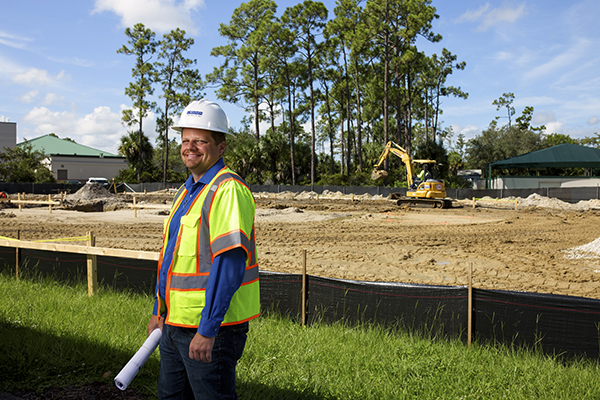
Ryan Scott ’16 recently completed the civil plans for FGCU’s new Center for Entrepreneurship and Innovation, and he is pumped. As the engineer of record for the civil plans, Scott was responsible for assembling construction plans that detailed everything for the overall site, from the parking lot to the fire, drainage, drinking water and sewer lines. “In other words, I need to make sure the site functions properly once it’s built,” he explains.
This accomplishment would be a point of pride under any circumstances, but particularly so because Scott is the first FGCU graduate to have his name on the plans of a university building. He has been heavily involved in the development of the university’s new academic building that will house The Water School as well.
Construction is underway on both structures.
Scott’s journey to this point has been more than a decade in the making. He began working on his first project at FGCU in 2007 after joining Johnson Engineering – a civil engineering firm headquartered in Fort Myers – in 2005 as a designer fresh out of ITT Technical Institute in Canton, Michigan. Since then, he has worked on at least 14 projects at FGCU.
While gratifying, Scott’s path hasn’t been easy – or linear. He was laid off from Johnson during the economic downturn in 2009 but knew at that point that he wanted to pursue a career in civil engineering. So, in 2010 he enrolled at FGCU and began working fulltime toward a bachelor’s degree.
Entering college as an undergraduate in civil engineering at age 27 was challenging on several fronts, Scott says. For one, he had a vastly different perspective on the program than his 18-year-old classmates. “I already had work experience in the field, and I was still working fulltime while going to school, first at a waste treatment plant and then starting again in 2013 back at Johnson Engineering, so school wasn’t about socializing and partying for me; I was focused entirely on learning.”
Scott, who received the Johnson Engineering Endowed Scholarship, also faced the challenge of balancing the theoretical knowledge he was gaining from coursework with the practical knowledge he was applying daily in the field. The two didn’t always mesh, he found. “Oftentimes, there was an interesting disconnect between what was being taught in the classroom and the skills I knew we needed at our firm,” he says.
But FGCU professors were willing to engage his alternate perspective. “I really enjoyed my classes with my environmental engineering associate professor (Simeon) Komisar. He was open-minded and interested in hearing what I had to say about my real-world experiences,” he says. “It helped my learning process to debate topics, and I think it offered other students a different perspective on the information being presented.”
Scott, a Jovan Zepcevski Engineering Scholarship recipient, cites former associate professor Kristoph-Dietrich Kinzli (who taught civil and environmental engineering) as another important influence. “He taught my water resource class and although I’m not sure he always appreciated me contradicting his advice, he was one of the best teachers I had at FGCU.”
While Scott is happy he put in the effort, he concedes that earning a bachelor’s degree while working fulltime was difficult; the journey took six years and several groups of classmates beat him to the finish line. Nevertheless, he believes the end justified the means. “It’s been a really long road and a lot of hard work, but it’s also been a good experience.”